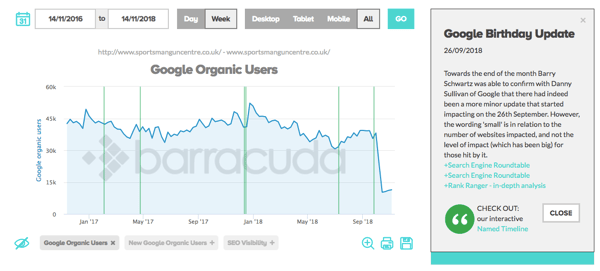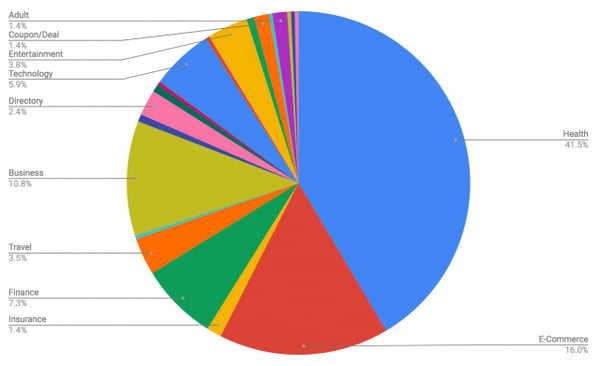Google update their algorithms several times each year, in order to present searchers with the most relevant and trustworthy results. Get ahead of competitors this coming year by focusing on authoritative, quality content.
The August 2018 algorithm update, dubbed ‘The Medic Update’, is one of the most mysterious changes to date. By disproportionately affecting the health industry, this update caused a stir amongst website owners, content producers and SEO marketers.
This ‘broad core algorithm update’ showed drastic effects in SERPs (search engine results pages). Yet Google assured users:
“There’s nothing wrong with pages that may now perform less well. Instead it’s that changes to our systems are benefiting pages that were previously under-rewarded.”
As with any update, some sites may note drops or gains. There’s nothing wrong with pages that may now perform less well. Instead, it’s that changes to our systems are benefiting pages that were previously under-rewarded....
— Google SearchLiaison (@searchliaison) March 12, 2018
The Good News: website owners aren't actively doing anything wrong.
The Not so Good News: it's the absence of content that causes the issue, and it’s not immediately obvious how to counteract this change and boost search rankings.
What is clear is that, now more than ever, Google is favouring sites with quality content, from credible experts, and solid domain authority.
What we know about Google’s Algorithm Update:
The ‘Medic Update’ was the second major update to Google’s algorithm in 2018. Initially rolled out on July 22nd, the majority of sites noticed a marked change on August 1st.
Google claimed this was a global, core update, meaning it impacts all sites and industries, everywhere.
However, certain industries and site categories were disproportionately altered in rankings. According to Moz, household names like Buzzfeed, Betty Crocker and Mens Health suffered up to -59% loss in search position; meanwhile, Glass Door rose by a huge 53%. These drastically separate “winners and losers” raised a lot of concerns about the update: how can I fix my website to appear higher in Google?!

Some sites have experienced a drastic drop in organic users since the recent Google updates.
Which Industry Sectors Were Affected:
The headlines all focus on the ‘Medic update’: according to research undertaken by Search Engine Roundtable, the health sector accounted for 41.5% of those sites that were adversely affected. This included medical, health and fitness services, and healthy lifestyle advice pages.
The second-most affected sector was eCommerce, accounting for 16% of the sample that had drastically changed rankings. (It’s worth nothing that many of these sites sold health/medical products.)
But this algorithm update was not industry specific.
 A Pie Chart to show which industries were most affected, from SEO Roundtable.
A Pie Chart to show which industries were most affected, from SEO Roundtable.
Those pages that Google categorises as ‘Your Money or Your Life’ (YMYL) also saw some extreme shifts in ranking. These breaks down into health, finance and legal industries, or any pages that might “potentially impact the future happiness, health, financial security or safety of users”.
This means that your site is likely to be affected if you:
-
Offer health-related or medical information
-
Provide legal or financial advice
-
Publicise news/information around political, social and governmental issues
-
Make recommendations for life-affecting decisions (e.g. buying a house or adopting a child)
-
Undertake financial or shopping transactions, thereby collecting payment details
-
Solicit personal information from users (e.g. ID numbers).
Ways to Improve Your Website’s Search Ranking:
Google's Quality Evaluator Guidelines provide extensive details around their quality ranking system for web pages. However, the document focuses on providing definitions, examples and hints, rather than direct guidance advice.
There is no surefire way to escape the ‘Medic update’, but Google’s guidelines certainly stress the importance of authoritative, quality content. Here are the best practices to maintain your website’s ranking position:
Focus on E.A.T: Expertise, Authority, Trust
Google judges websites on the relevance and authority of their content. So much more than creating long-form, keyword-rich articles, content requires proof of credibility.
Domain Authority is judged on a myriad of factors, with an important focus on valuable internal and external links. The quality of on-page content plays an important part.
Increasing your domain authority will make your site appear more trustworthy to readers and to search engines. Be sure to:
-
Include an ‘About Us’ page: make sure that your website, company or brand has a page to directly showcase your expertise. Include awards, accreditations and industry recognition that prove you are trustworthy.
-
Provide detailed author bios: an authoritative website must be supported by trustworthy content authors. Where relevant (on a blog, for example), include well-rounded bios for each author, spotlighting their credibility and expertise.
(Note: for more main content pages, the website’s ‘About Us’ page acts as the author’s bio.)
-
Update information regularly: content production is not a one-time pursuit. Particularly in medical, legal and financial sectors, it is vital that information is kept up-to-date.
-
Curate positive customer/user reviews: reviews should always be read with caution. A higher quantity of reviews should provide a clearer picture of a website’s credibility, on average. Encourage clients, customers and users to share their experiences of using your site/service.
Produce Quality Content
Top quality content is created with user intent at the forefront. Ensure that all content answers a clear user question, providing the answers they want, when and where they need it.
-
What users want: directly answer search terms and queries. Tools such as Google’s ‘People Also Ask’, or Answer The Public, can help to define useful topics and titles.
-
Where they want: implement logical and valuable linking structures. Content is useless if a user can’t find it. Make sure that any new content is logically placed within the site architecture and accessible via multiple internal links.
-
When they want: keep your content up-to-date. Users are more likely to search for relevant content in response to industry news, so be sure to react to relevant changes.
Keep up with SEO Best Practice
Following SEO best practice is the first step to maintaining a high ranking position. Make sure that all technical and on-page SEO practices are in order. Here's a quick run through of SEO best practice (for more details, see our Essential SEO guide):
-
Avoid Duplication; Create Unique Page Titles
-
Write Descriptive Metadata with clear Calls to Action
-
Structure your Pages, with Logical Subheadings
-
Reduce Page Loadspeed (see our top tips for website speed improvements)
-
Implement Mobile Responsive Design (download our eBook on Mobile-first for SEO)
-
Use Schema Markup/Data Highlighter for Rich Snippets
-
Provide Explanatory Image Tags and Alt Text.
We provide SEO training days for beginners, including detailed insights for lead generation and eCommerce. Keep an eye out for upcoming events in the coming year.
For more advice on boosting your website’s organic search visibility, get in touch with our SEO and Content Strategy experts.








